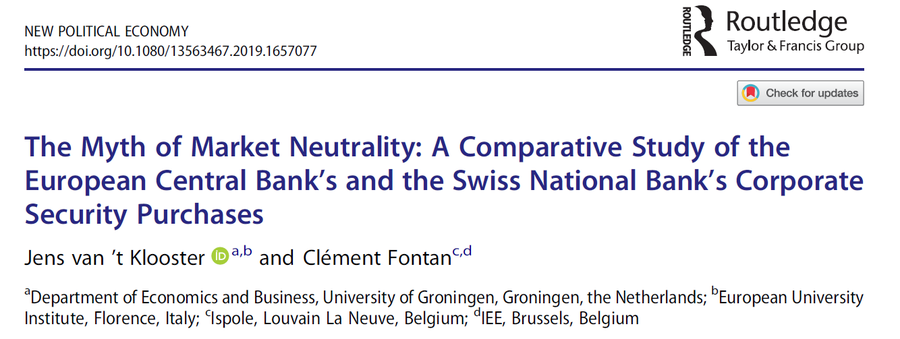(https://twitter.com/rohangrey/status/1182308869881643015)
erabiltzaileari erantzuten
My colleagues
@andresintheory, and
recently made a similar argument about the risks of mission-creep concerning public banking in the context of Green New Deal financing: https://businessinsider.com/green-new-deal-climate-change-government-spending-no-private-money-2019-9
Glad to see these issues getting more attention!
The Green New Deal will be tremendously expensive. Every penny should go on the government’s tab.
Warren B. Mosler #MMT@wbmosler
eta
erabiltzaileei erantzuten
The trick is to keep public banking from getting politicized.
Designing a public banking system around the profit motive *is* politicizing it in a particular way…
Katharina Pistor@KatharinaPistor
Emphasis on “in a particular way”: a public purpose, a governance structure to achieve it an protections to stay on mission.
Indeed. And there may be good arguments why that approach is preferable over other approaches (nationalizing banking, network of decentralized non profits, etc). My point is just that those arguments *are* political. Not a question of “politicizing or not”, just “in what way”.
Warren B. Mosler #MMT@wbmosler
My point remains… 😉
The point doesn’t mean anything without more context/clarification – you can’t prevent something that’s inherently politicized from becoming politicized.
eta
erabiltzaileei erantzuten
What about Adam Smith who wrote that unconstrained self interest leads to Pareto efficient outcomes? #sarcasm
How ’bout that?@How_bout_that_
eta
erabiltzaileei erantzuten
Should have used all caps from the public to maximization part…really needs the emphasis…;-)
Frank van Lerven@Frank_vanlerven
eta
erabiltzaileei erantzuten
Clint Ballinger@clintballinger
The moral basis for separating public from private endeavors (& why both are good but very different, & why worse thing we can do is mix them) is wonderfully explored here. Highly recommend
Clint Ballinger@clintballinger
I should have said profit seeking from public
oooooo
Warren B. Mosler #MMT@wbmosler
My point remains- for informational purposes- that public banking carries a serious risk of specific lending decisions being influenced by partisan political considerations.
That is a much narrower point than what you originally said! I understand this concern, although as mentioned in the op-ed, I’d be equally if more concerned long term with the distortive effects of centering a public banking system around the profit motive. Lots of tricks needed.
Warren B. Mosler #MMT@wbmosler
This might be helpful:
Proposals for the Banking System, Treasury, Fed, and FDIC (draft) – The Center of the Universe
[Skip to the end] Proposals for the Banking System, Treasury, Fed, and FDIC (draft) [top]
eta
erabiltzaileei erantzuten
I’m well familiar, thanks. I cited it in one of the first working papers I wrote over 5 years ago: http://binzagr-institute.org/wp-content/uploads/2017/06/WP-116.pdf
But it doesn’t actually address the question I just raised, ie merits of profit vs non-profit based banking.
2019 urr. 13
oooooo
(https://twitter.com/wbmosler/status/1183412277363564552)
Warren B. Mosler #MMT@wbmosler
My point remains- for informational purposes- that public banking carries a serious risk of specific lending decisions being influenced by partisan political considerations.
Aren’t they (indirectly) politically-influenced anyway through the collateral framework?
Depends on your definition of “political”. Letting the free market rip could be said the be political or non-political. It’s non-political in the sense that politicians don’t specifically do anything.
My point is that collateral frameworks mean that CBs don’t just let the free market rip; they influence lending decisions (if making a loan creates an asset on the eligible collateral list, you’re more likely to make it).
The venerable transition from “because of” to “in order to”, surely?
What do you mean?
If I discover that “A led to B” (A ’caused’ B) than if I want B I am going to try to make A (happen) (In order to get B I can/must make A).
Oh I see. But I think it’s part of the intention of central banks to influence lending through collateralisation. But I’m no expert; I think @clemfon has written on this.
The ECB, in particular, are shocked and dismayed at your scurrilous insinuation. 😉
Ah yes, the institution so neutral that the colour grey calls upon them for consultation
On a serious note:
Jens van ‘t Klooster@jvtklooster
abu. 26
1/ Very happy that this week @NPEjournal published online “The Myth of Market Neutrality”, co-authored with @Clemfon. This is just in time for the 2019 Jackson Hole conference, where central bankers debate the future of unconventional monetary policy. https://tandfonline.com/doi/full/10.1080/13563467.2019.1657077
Warren B. Mosler #MMT@wbmosler
eta 5 beste erabiltzaileei erantzuten
Do they mention that coercive taxation obviates neutrality?
2019 urr. 13
Greek Stav@GrkStav
oooooo
(https://twitter.com/jvtklooster/status/1183400231624417287)
Jens van ‘t Klooster @jvtklooster
eta 6 beste erabiltzaileei erantzuten
On collateral and market impact we cite https://ecb.europa.eu//pub/pdf/scpops/ecbocp49.pdf
They explain how they minimize impact on markets. That’s still political, though, as per Rohan’s original point, but less targeted like @wbmosler‘s.






